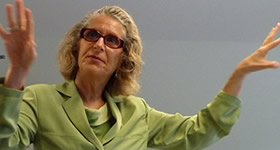Yes, I’m still thrilled that we the citizens of the U.S. elected Barack Obama.
But let’s not compliment ourselves too terribly much. We still have lots of work to do.
Read Orlando Patterson’s op-ed piece, “An Eternal Revolution,” in the New York Times of 11-07-08. He writes about the fear that our founding fathers had of creating this democracy. After all, they were the establishment, the privileged, the white men of power.
So their dream of an inclusive electorate, political participation, and political power sharing had some caveats. Blacks, women, and the young were excluded. Patterson reminds us that our history of democracy is the struggle for all three of these groups to be included.
And he notes the importance of American women in electing Obama. Patterson talks about the “quiet but momentous change [that] took place in the 1980s,” as important as the civil rights movement, he says. For the first time since winning the right to vote, women voted in greater numbers — and more progressively — than men.
His insightful analysis is a wake-up call for us all. A reminder of how far we have come and how far we still have to go.
So I’m proud that more women vote. But I want a woman president. And I’m proud that more women run for elective office – but more need to run because more women need to be elected.
And I’m proud that we elected a president who happens to be a person of color. And I hope we will do that again and again.
But I’m still not happy. I’m dismayed by the people who refuse to respect and treat fairly those of a different sexual orientation or gender identity.
Oh California, shame on you. How could you vote “yes” for Proposition 8? How could you deny my gay and lesbian friends the right to marry? And how about Arkansas, Arizona, and Florida, too?
More than 40 states in the U.S. now have enshrined prejudice in their laws, either through constitutional bans or laws against same-sex marriages. That’s like the original U.S. constitution that denied voting rights to women and blacks.
How can we deny basic human rights to all people?
I usually refer to my husband in conversation as my “life partner.” Why? Because I want to startle people. I want them to wonder if I’m married or if I’m a lesbian or or … I hope I make people uncomfortable referring to my life partner. I hope that lots of my stories make people uncomfortable.
Yes, Tom and I are married. A civil ceremony, not a religious one. But society recognizes us as married. We’ve been together for fewer years than many, many of my friends. For example, Pamela and Clare cannot get married, not even in a civil ceremony.
I’m proud of Connecticut, my border state. And the Connecticut court wouldn’t even allow civil unions to be considered equal to marriage. Good for them. It’s marriage. That’s it. That’s what society recognizes.
The New York Times said it well in an editorial on November 6, 2008: “…the danger of allowing the ballot box to be used to take away people’s fundamental rights.” I hope that the California court comes back and slaps down that ballot box decision.
Read Anna Quindlen’s lovely column in the November 24, 2008 issue of Newsweek. She writes about the Loving versus Virginia case, the 1967 U.S. Supreme Court decision allowing whites and blacks to marry.
Mildred Jeter, a black woman, and Richard Loving, a white man got married in Washington D.C. and then returned to their home in Virginia. There, they were arrested for miscegenation (which, Ms. Quindlen notes, is a “$10 word for bigotry”).
Apparently the Virginia trial judge talked about how God didn’t like black and white people marrying. The judge wrote, “The fact that He separated the races shows that he did not intend for the races to mix.” (I wonder how gods and goddesses feel, having so many awful things attributed to them?)
Anyway, back to the Loving versus Virginia decision. I laughed out loud as I read Ms. Quindlen’s next statement: “The Supreme Court…passed over the Almighty for the Constitution, which luckily has an equal protection clause.” Finally, in 1967, the U.S. Supreme Court unanimously stated that “marriage is one of the basic civil rights of man.”
Marriage…one of the basic civil rights of man, of people. No matter the color. And someday, no matter the sexual orientation.

